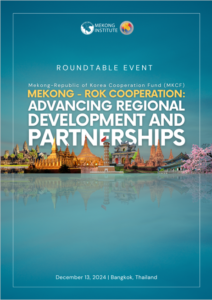The Mekong – RoK Cooperation Fund (MKCF), established in 2013, serves as a pivotal platform promoting collaboration in seven priority sectors between the Mekong countries—Cambodia, Lao PDR, Myanmar, Vietnam, and Thailand—and the Republic of Korea (ROK). Guided by the Han River Declaration of 2011, the MKCF supports projects that span key sectors including Culture and Tourism, Information Communication Technology (ICT), Environment, Infrastructure, Agriculture and Rural Development, Human Resource Development, and Non-traditional Security Challenges. The Mekong Institute (MI), as the coordinator, these projects foster regional integration, drive sustainable growth, and bring shared benefits to multiple countries across the Mekong region.
As MKCF marks its achievements through more than 48 impactful projects, MI is pleased to announce the Mekong – RoK Cooperation: Advancing Regional Development and Partnerships event, set for December 13, 2024, in Bangkok, Thailand. This gathering will celebrate our successes and share lessons learned, while exploring new partnerships with public and private stakeholders. By addressing emerging challenges in economic, social, and environmental sustainability, the event will pave the way for future projects that continue to strengthen regional collaboration. Key officials, MKCF Project Implementing Agencies, and development partners will convene to reinforce their commitment to advancing cooperation and inclusive growth in the Mekong region.
The event aims to showcase the results of regional cooperation efforts initiated through cooperation projects, deepen understanding of sector-specific issues, foster collaboration for sustained impact, and explore pathways to scale and integrate project outcomes into broader development strategies. The specific objectives include:
- Showcase Regional Cooperation among Mekong Countries and RoK in Seven Sectors
- Highlight Emerging Regional Sector-Specific Issues
- Explore Opportunities to Sustain Pilot Project Results and Outcomes to Promote Triangular Cooperation
- Showcase Achievements and Success Stories of MKCF Projects
- Develop Actionable Strategies for Sectoral Regional Sustainable Development
• Officials from the foreign missions of Mekong countries and the ROK based in Bangkok, Mekong-ROK Focal Point in the Ministry of Foreign Affairs of the Mekong countries and the ROK:
Explore and update progress on cooperation through development projects for deepening cooperation mechanism.
• Senior officials from the line ministries of the Mekong countries and the ROK, representing the seven priority sectors of Mekong-ROK Cooperation:
Highlight triangular or quadrangular cooperation with the ROK, address regional issues, and present collaborative solutions for cross-sector and cross-border project management.
• Senior officials and project team leaders from international development partners, including ASEAN Korea Cooperation Fund (AKCF), BIMP-EAGA–Republic of Korea Cooperation Fund (BKCF), Korea International Cooperation Agency (KOICA), Korea Trade-Investment Promotion Agency (KOTRA) etc.:
Explore synergies with MKCF PIAs and discuss trilateral and quadrilateral cooperation opportunities to sustain and expand successful projects.
• Business leaders and key officials from the private sector:
Engage with business entities, impact investors, and financiers to sustain project outcomes, maximize the long-term impact, and identify and invest in new project models and opportunities in the Mekong region.
• Project team leaders from the MKCF Project Implementing Agencies (PIAs):
Share project achievements and impact stories while exploring replication opportunities through networking with investors and stakeholders.
This event will consist of 4 main parts:
Opening Session: Welcome, Keynote Speeches & Event Introduction
Project Exhibition & Networking: Display of Achievements and Cooperation Opportunities
Sector-Specific Roundtable: Project Contribution to Regional Development Goals & Strategies for Sustainability and Collaboration
Closing & The Way Forward: Roundtable Meetings Summary and Actionable Recommendations



